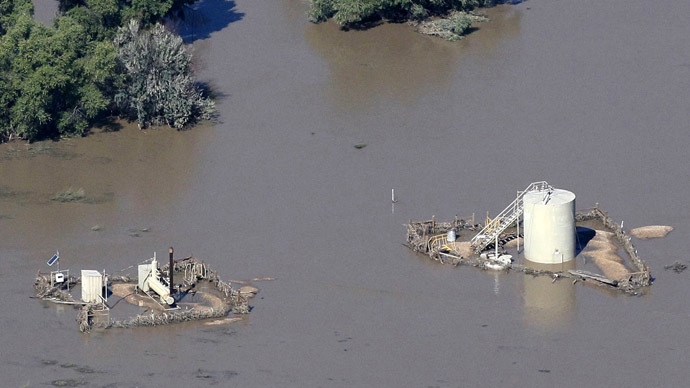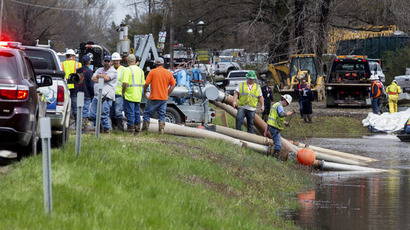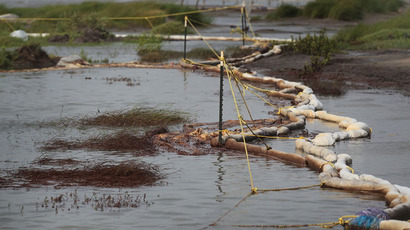Oil spill dumps over 5k gallons of crude across flood-drenched Colorado

More than 5,250 gallons of crude oil have spilled into a river in Colorado, contaminating much of the same region that was ravaged days earlier by a monumental flood that left no fewer than eight residents dead.
The Denver Post reported on Wednesday evening that the Colorado Department of Natural Resources was alerted of the spill that afternoon by Anadarko Petroleum, a Texas-based oil and gas exploration company.
"To date, we are aware of two tank batteries that were damaged by flood waters, and have associated light-oil releases,” Anadarko acknowledged in a press release.
The crude reportedly emptied out of damaged tanks south of the town of Milliken where theSt. Vrain and South Platte Rivers meet near Boulder, the county’s most populous city with almost 100,000 residents.
Todd Hartman, a spokesperson for the Colorado DNR, told the Post that state authorities are unsure of when the Anadarko spill happened, and stressed that it was only the first incident that was confirmed to his office after reports of widespread damage following last week’s floods.
"You have operations that are entirely underwater," Hartman explained to National Geographic this week.
Days before Anadarko alerted officials of the spill, Hartman’s office issued a statement warning residents that “many contaminants, such as raw sewage, as well as potential releases of chemicals from homes, businesses and industry, may be contained in the floodwaters" that displaced hundreds of people and cost upwards of $2 billion in property damages, according to some early estimates.
Already, though, other companies are confirming that flood waters
have damaged their tanks and wells, leaking other contaminants
from its containers into the already ravaged region.

Representatives with another large natural resource company, Noble Energy Inc., said late Wednesday that they have also alerted the Colorado Oil and Gas Conservation Commission that one of its wells “appears to be releasing a limited amount of natural gas.”
The Post reported that multiple state and federal offices have been alerted of the Anadarko spill, including the United States Environmental Protection Agency and the Colorado Department of Public Health and Environment. By Thursday morning, the paper was reporting that industry crews and state officials had already reached the scene near Milliken and had placed absorbent booms in an attempt to begin a clean-up mission.
Practically 1,900 oil and gas wells in the region were already shut down as a precaution due to high waters, and the Colorado Oil and Gas Association said crews totaling roughly 600 industry personnel are inspecting and repairing sites, conducting aerial and ground surveillance and identifying and determining locations of possible impairments.
In all, the region of Colorado impacted by the storm contains around 19,000 active wells, CBS News reported this week.
Anadarko and Noble have each shut-down around 10 percent of their respective operations, and another company — Encana Oil & Gas — shuttered hundreds of its 1,241 area wells when the section of the start started to go under water last week. Andarko has also closed down around 20 miles of pipeline, the Post reported.
"This State of Colorado and the US Environmental Protection Agency must force Anadarko to clean it up -- no matter the cost -- and make reparations to the public, including paying fines and enforcing the Clean Water Act which may include civil and criminal penalties,” Gary Wockner of Clean Water Action said in a statement on Wednesday.














